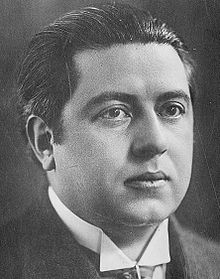Henri Béraud

Henri Béraud (21 September 1885 in Lyon – 24 October 1958 in Saint-Clément-des-Baleines) was a French novelist and journalist. He was sentenced to death -later commuted to life imprisonment- for collaboration with the Germans, in 1945.
Life
Henri Béraud was the son of a baker. In 1903 he began his work in journalism.[1] He joined the satirical weekly Le Canard enchaîné in February 1917, recommended by Paul Vaillant-Couturier, and Roland Dorgeles. He renewed his old friendship with Albert Londres. He also wrote for Le Crapouillot, the magazine started by Jean Galtier-Boissiere.[citation needed] He published stories, a short series (L'angoisse du mercanti ou le compte du tonneau in 1918), a study on Lyonnais humor, and especially polemical articles. He was also an international reporter at the Petit Parisien and Paris-Soir, from 1934 - 1944.[citation needed]
He later became known as one of France's best-selling novelists and reporters, and won the Prix Goncourt in 1922. He was virulently Anglophobic and to a lesser extent antisemitic. These factors led him to support Vichy France.[2] He did this by contributing pieces to the Fascist weekly paper Gringoire,- George Orwell called it "the most disgusting rag it is possible to imagine"[3]- indicating his hatred of British forces and criticism of the Free French, although he also censured Nazism[citation needed].
His aid of the Vichy government caused him to be sentenced to death in 1945, but several writers, including François Mauriac intervened on his behalf. The sentence was commuted by Charles de Gaulle to life imprisonment. By 1950 he was freed for health reasons. He died eight years later.[4]
Works
- L'École moderne de peinture lyonnaise (1912)
- Le Vitriol de Lune (1921, prix Goncourt 1922)
- Le Martyre de l'obèse, (prix Goncourt 1922)
- Lazarus, Albin Michel, 1924
- Ce que j'ai vu à Moscou, Les Éditions de France 1925
- Le Bois du templier pendu, Les Éditions de France, 1926
- Ce que j'ai vu à Berlin, Les Éditions de France, 1926
- La Gerbe d'or, Les Éditions de France, 1928
- Ce que j'ai vu à Rome, Les Éditions de France 1929
- Qu’as-tu fait de ta jeunesse ? (1941)
- Les Lurons de Sabolas (1932)
- Ciel de suie (1933)
- Faut-il réduire l'Angleterre en esclavage (1935)
- Les raisons d'un silence, Inter-France, 1944
- Les derniers beaux jours, Plon, 1953
- Portraits de contemporains.
- Retour sentimental vers Alphonse Daudet, 2001
- Écrits dans Gringoire (1928–1937), 2003
- Au Capucin Gourmand
- Le Flâneur salarié
- "Rende-vous européens", Les Éditions de France, 1928
External links
References
- ^ Biography.com
- ^ The Collaborator: The Trial & Execution of Robert Brasillach By Alice Yaeger Kaplan: page 204
- ^ George Orwell, Collected Works, I Belong to the Left, p.22
- ^ Time Magazine obituary
